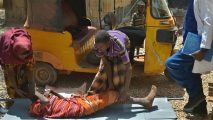Privacy Overview
This website uses cookies so that we can provide you with the best user experience possible. Cookie information is stored in your browser and performs functions such as recognising you when you return to our website and helping our team to understand which sections of the website you find most interesting and useful.


















22, January 2020
Southern Cameroons War: Government, Separatists Indicted For Killings, Torture, Kidnappings 0
“Human Rights Watch, HRW, has released its 2020 report on the human rights barometer on Cameroon, in which it has indicted Cameroon Government forces for killings, destruction of property, burning of villages, torture, alongside other human rights violations.”
The report also indicted Separatist fighters in the Anglophone Regions for kidnappings, torture, and occupation of schools.
Citing examples from documented cases, the HRW report on the situation in Cameroon, dwelling on the happenings of 2019, noted in its opening statement that: “Armed groups and Government forces committed widespread human rights abuses across Cameroon throughout 2019.”
The report, though largely concerned with the atrocities in the Northwest and Southwest Regions of the country, also documented attacks by the Boko Haram sect in Cameroon’s northern regions. It points out that the sect carried out over 100 attacks, killing over 100 civilians in 2019.
On the situation in Anglophone Cameroon, the report noted: “In Anglophone Regions, violence intensified as Government forces conducted large-scale security operations and armed Separatists carried out increasingly sophisticated attacks.
Over 3,000 civilians and hundreds of security forces personnel have been killed in the Anglophone Regions since 2016 when the crisis started. The unrest in these regions led to the displacement of over half-a-million people.”
Killings, destruction of Property, Torture by Government Forces Narrowing its report to groups, and pointing out their abuses, HRW accused Cameroon Government forces of destroying property, killings, torture, among others.
“Responding to increasing attacks by armed Separatist groups, security forces killed scores of people, burned hundreds of homes and other property in villages and cities across the Northwest and Southwest Regions, and tortured suspected Separatists in detention,” the report states.
The report cited the February 6 storming of the Bole Bakundu Market by State security officers, leading to the death of 10 men; the April 4 assault on Meluf village in the Northwest Region, which led to the killing five civilian males, including one with a mental disability, and wounding one woman.
Eighty homes were broken into, looted and some burnt; the May 15 incident in Mankon, Bamenda was cited, where Air Force and BIR soldiers killed three men, and burnt over 70 houses; the September 24 attack on the Bafut Royal Palace, a UNESCO World Heritage site – where soldiers wounded a man and looted the palace museum, taking several precious artefacts; the incommunicado detentions of several people at the State Defense Secretariat, popularly known by its French acronym, SED, where Gendarmes and other security operatives used torture, including severe beatings and near-drowning, as well as other ill-treatment to force suspects to confess crimes or to humiliate and punish them.
The report also stated that: “While the Government maintained it did not tolerate crimes committed by security forces, it failed to demonstrate progress in investigating and punishing them.”
Kidnappings, Torture, Occupation of Schools By armed Separatists HRW’s report also indicted separatist fighters, stating that: “Armed Separatist groups have killed, tortured, assaulted, and kidnapped dozens of people, including students, teachers, clergy, and administrative and traditional authorities.”
Citing particular cases, HRW pointed out the February 16 abduction of 170 students, mostly girls under 18, a teacher, and two guards from a boarding school in Kumbo, who were released a day after; the mid-May torture of a man in an abandoned school in Bali village, Northwest Region; the June 18 incident where over 40 people were beaten and robbed in Bafut; the June 28 abduction of SDF’s Chairman, John Fru Ndi, as well as the abduction of the Bamenda Archbishop, Cornelius Fontem Esua.
Apart from the situation in Anglophone Cameroon, HRW also documented the crackdown on opposition protests, as well as the detention of peaceful protesters. It also recorded the crackdown on sexual relations between persons of the same sex.
The report also cited the lack of transparency in the trial of security personnel accused of carrying out human rights violations. It stated that: “The visible lack of accountability appears to have fuelled abuses, including killings, destruction of property and torture.”
The report mentioned the US’s decision to scale back military support to Cameroon, due to the country’s alarming human rights abuses. It also mentioned Germany’s decision to end its military cooperation with Cameroon, alongside the stance of other international actors, who generally take exception to the many human rights cases of abuse by the Cameroon Government, especially in Anglophone Regions.
Culled from Cameroon Info.Net